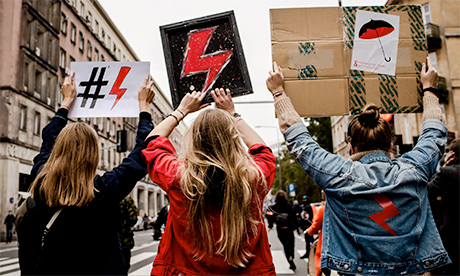For 14 nights they have marched, enraged by a near-total ban on abortion that has stirred a generation to stage the largest mass demonstrations that Poland has seen since Solidarność toppled the communist regime in the 1980s.
Until soaring coronavirus numbers and a looming national lockdown made it almost impossible, up to a million people nightly defied a government ban on protests, taking to the streets from Warsaw to Łódź, Poznań to Wrocław, Gdańsk to Kraków.
The protests, led by the grassroots women’s movement Ogólnopolski Strajk Kobiet (OSK, or All-Polish Women’s Strike), have shocked the ruling conservatives and created a new political faultline that, analysts say, could spell more serious problems for the party.
“I think it is a whole backlash against a patriarchal culture, against the patriarchal state, against the fundamentalist religious state, against the state that treats women really badly,” said Marta Lempart, a 41-year-old lawyer and one of OSK’s leaders.
The group has outlined areas extending far beyond abortion rights where it says urgent change is needed: stronger and wider women’s and LGBTQ+ rights in general; the separation of church and state; more support for healthcare, small businesses and education; full judicial independence.
The ruling Law and Justice party (PiS) “should be protecting us, the citizens of Poland”, Lampert told the media this week. “They are turning their backs on us, talking just to the Polish government. They should be talking to us.”
Predominantly Catholic Poland already had one of Europe’s strictest abortion laws when, on 22 October, its constitutional tribunal ruled that terminations in instances of severe foetal anomalies, which accounted for all but about 30 of the 1,110 abortions performed legally in Poland last year, were “incompatible” with the constitution.
The decision by the court’s 15 pro-PiS judges, many of them appointed unlawfully, would allow terminations only in instances of rape, incest and when the mother’s life is at risk – a tiny fraction of cases. Women’s groups estimate an additional 200,000 Polish women have abortions either illegally or abroad each year.
The ruling sparked an immediate reaction. Across the country, hundreds of thousands of demonstrators, mainly women and young people, took to the streets with banners proclaiming “I wish I could abort my government”, “This is war” and “Women’s hell”.
On Tuesday – apparently in response to the protests – the government indefinitely postponed publishing the court’s decision in the official journal, preventing it from coming into effect (and raising major constitutional questions if it tries to do so later).
But the genie may be out of the bottle.
While surveys show more than 60% of Poles support the status quo on abortion, barely 15% back the proposed changes.
This has mobilised a generation not previously engaged with politics and stoked existing, wider anger at what many see as the steady erosion of democratic norms since PiS came to power in 2015.
Maria Kowalczyk, 38, a beauty journalist, said at a protest in Warsaw that Poland was “years behind.
In this country, because of the politics and doctrine of the government and the religious fanatics, someone who is different is worse. The way they treat LGBT people, migrants, all minorities – and now women … Society has had enough.”
Julia Estera, 30, a performance and makeup artist from Łódź, said Poland was no longer a free country.
“We are a religious state where we are all demanded to think in one possible way.” Bianka, 15, and Maja, 16, said Poland’s youth would not back down. “We don’t want to live in a country where we don’t have a choice, where everything is decided for us.” Continue reading
